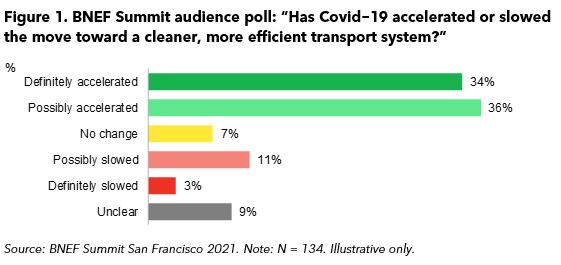Passenger vehicle sales fell roughly 6% and 15% year-over-year in China and the U.S. in 2020, respectively, but the U.S. drop was not as steep as the one seen after the 2008 financial crisis as Elaine Buckberg, chief economist at General Motors reminded us during the opening panel of the San Francisco Summit, which was hosted by BloombergNEF online on February 2-3.
While U.S. sales plunged 27% in 2009, they only fell by 15% in 2020. According to General Motors, a few factors explain the relative resilience of the market: very low interest rates, fear of public transit, excess discretionary funds, and urban-suburban migration. In shared mobility, Martyn Briggs of Bank of America Securities noted that while demand for ride-hailing trips fell by 50-80% in 2020, depending on the market and company, a recovery was well under way, with the most nimble companies pivoting aggressively into other on-demand services, like food delivery.
An audience poll at the BNEF Summit showed that 70% of the audience believed that the Covid-19 pandemic has possibly or definitely accelerated the decarbonization of transport (Figure 1) a sentiment shared by General Motors, Ford and Bank of America.

Corporate sustainability and fleet decarbonization
Companies are increasing their decarbonization commitments, and the purchasing of both clean power and zero-emission vehicles is ramping up. Still, not all vehicle segments are easy to decarbonize. The Summit looked at companies pioneering zero-emission vehicle adoption in fleets, and assessed the potential for renewable fuels to help decarbonize road transport. Panelists shared their insights on vehicle-ownership structures, model availability, residual values and business models for charging infrastructure.
While Southern California Edison aims to electrify 100% of its light-duty vehicles and 30% of its medium-duty vehicles by 2030, Uber wants 100% of its rides to be in zero-emission vehicles by 2040 globally (and by 2030 in some markets). Ikea, meanwhile, aims to have 100% of its home deliveries done with zero-emission vehicles by 2025. In clean fuels, Neste is aiming to achieve carbon neutrality by 2035 and said it was the first energy company to sign The Climate Pledge.
But challenges remain: Uber said the key barrier to ride-hailing electrification is the economics of EV ownership for drivers, and UPS noted that a lack of appropriate vehicle models is still a huge constraint. President of Global Fleet Maintenance & Engineering at UPS Carlton Rose said they “are working with all the OEMs and small disruptors to try to push the market forward to make production available for [zero-emission] vehicles so we can purchase them”.
International Policy and Climate Talks
BloombergNEF welcomed Canada’s Minister for Infrastructure and Communities Catherine McKenna, who expressed optimism about the relationship with the new Biden administration, including working with Gina McCarthy and John Kerry on climate issues. McKenna spoke about the effort of the Canadian government to meet its Paris Agreement and climate targets, including through the electrification of transportation. She spoke about Canada’s goal of 5,000 e-buses by 2025 and noted the efforts of domestic manufacturers like New Flyer, Nova Electric and Lion Electric that could bring localized benefits for communities across Canada. Watch the interview here.
North America Automotive and Battery Supply Chain
International trade, industrial policy and the automotive supply chain were the main focus of the first half of day two, where entrepreneur Henrik Fisker spoke about some of the challenges he faced in the past around battery supply when creating the original Fisker Automotive.
Separately, Assistant Deputy Minister for Strategic Policy and Innovation at Natural Resources Canada Frank des Rosiers pointed out the opportunities offered by the transition to EVs and the increase demand for batteries, Canada being well placed to attract investment with its mineral resources. Canada ranked fourth in the first BNEF Global Lithium-Ion Battery Supply Chain Ranking, published last September.
To the question whether EV supply chains will be global or local, executive director for global purchasing operations and strategy at Ford Motor Co. Lisa King said it won’t be binary: “We have to look at the fundamentals of scale, agility, risk and cost. For electrification, we may start with a global footprint that becomes more regional and local as demand scales up.”
On battery technology development, CEO of EnPower Annette Finsterbusch said not one technology will win the race, but instead a combination of technologies will appear over time. “We’re just at the beginning of a golden period for battery technologies,” she said. Watch the interview here.
Join our Munich Summit on May 17 if you want to hear more about supply chain, batteries and industrial competitiveness.
Wrapping up the Summit on innovation and AVs
The Summit also explored the topic of decarbonizing aviation in an executive interview with Paul Eremenko, co-founder and CEO of Universal Hydrogen Co. The industry, he noted, has a much longer development timeline than the auto sector, and ultimately argued that clean aviation would require disruptive thinking, not incrementalism, to take off.
The event concluded with a panel discussion on the near-term opportunities for AVs, and the implications for different parts of the value chain. Mark Rosekind, chief safety innovation officer at Zoox (who formerly led the National Highway Traffic Safety Administration in the U.S.) argued that autonomous-vehicle companies need to be more collaborative. Sharing safety data with one another anonymously – like the aviation industry – could dramatically speed up technology development, and prevent additional AV testing crashes.
Videos and further details of the sessions can be found here and on Vimeo while a more detailed note is available for clients here. Many of the topics will be discussed further at our New York Summit on April 13-14, Munich Summit on May 17, New Delhi on June 29, London on October 18-19 and Shanghai on November 30-December 1. We hope to see you there!